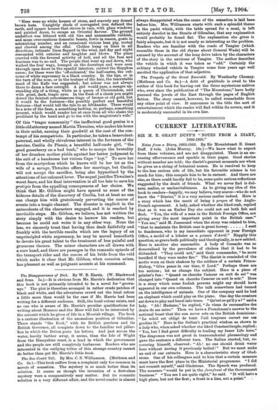The Disappearance of Dick. By W. B. Harris. (W. Blackwood
and Sons. 5s.)—It is obvious from Mr. Harris's dedication that this book is not primarily intended to be a novel for "grown- ups." The plot is therefore arranged in rather crude patches of black and white, and the adventures crowd out the local colour a little more than would be the case if Mr. Harris had been writing for a different audience. Still, the local colour exists, and no one who is aware of Mr. Harris's peculiar qualifications for writing about Morocco and the Moor will fail to be interested by the account which he gives of life in a Moorish village. The book is a curious illustration of the anomalous position of Gibraltar. There stands " the Rock," with its British garrison and its British Governor, all complete down to the familiar red pillar- box in which the Briton posts his letters. And just across the water, hardly farther away, it seems, than the Isle of Wight from the Hampshire coast, is a land in which the government and the people are still completely barbarous. Readers who are interested in the outlying tribes of this strange country cannot do better than get Mr. Harris's little book.
The Sea Could Tell. By Mrs. C. N. Williamson. (Methuen and Co. 6s.)—This book suffers from a complaint only too common in novels of sensation. The mystery is so much better than its solution. It seems as though the invention of a first-class mystery were a comparatively easy matter. But its romantic solution is a very different affair, and the novel-reader is almost
always disappointed when the cause of the sensation is laid bare before him. Mrs. Williamson starts with such a splendid theme in the yacht which, with the table spread for a meal, is left entirely derelict in the Straits of Gibraltar, that any explanation would probably be found flat. The explanation she gives is fairly adequate, but it is not nearly so interesting as the problem. Readers who are familiar with the roads of Tangier (which resemble those in the old rhyme about General Wade) will be amused by the account of the long drive taken by the characters of the story in the environs of Tangier. The author describes the vehicle in which it was taken as "odd." Certainly the solitary wheeled vehicle in Tangier some four years ago well merited the application of that adjective.
The Tragedy of the Great Emerald. By Weatherby Chesney. (Methuen and Co. 6s.)—A debt of gratitude is owed to the author of this book for leaving out the three mysterious natives who, ever since the publication of "The Moonstone," have hotly pursued the jewels of the East through the pages of English fiction. The story cannot, however, be called remarkable from any other point of view. It announces in the title the sort of entertainment which the reader will find within its covers, and it is moderately successful in its own line.










































 Previous page
Previous page